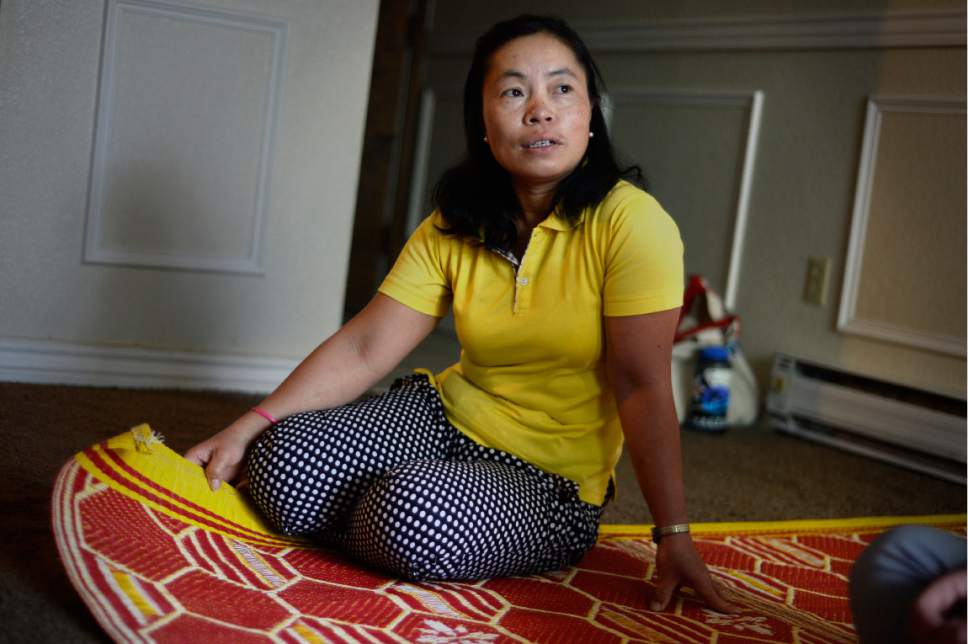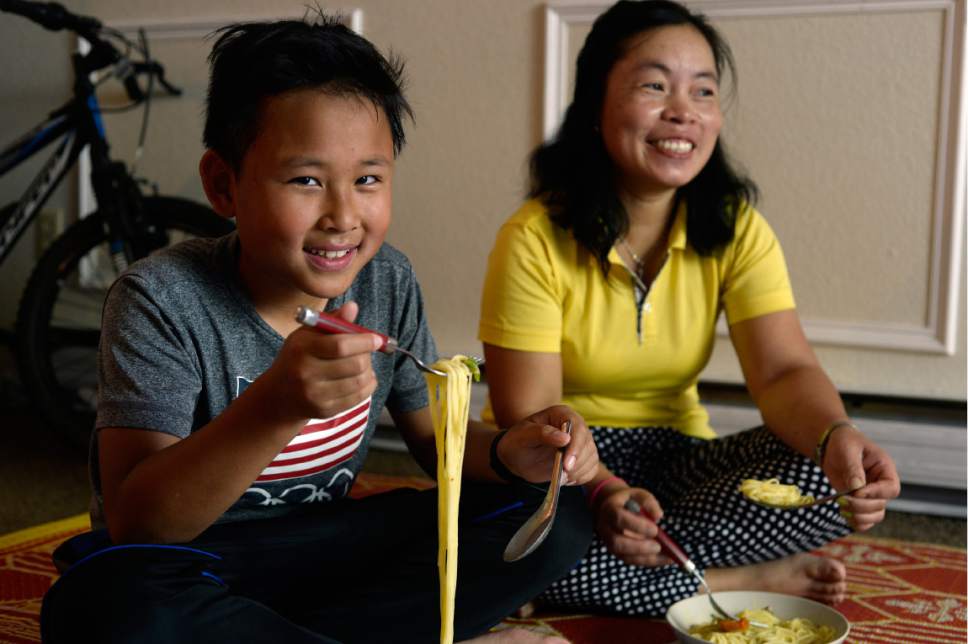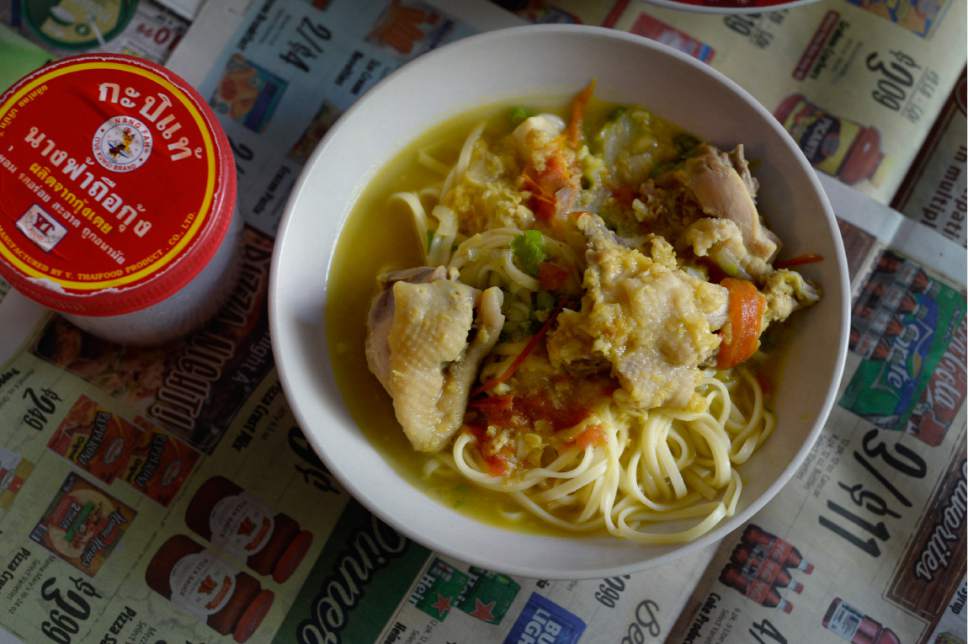This is an archived article that was published on sltrib.com in 2017, and information in the article may be outdated. It is provided only for personal research purposes and may not be reprinted.
Editor's note • When refugees immigrate to Utah, they arrive with little in the way of worldly goods. They do, however, bring their language, customs and recipes. In Refugee Kitchens, an ongoing series, The Salt Lake Tribune invited immigrants to cook dishes from their homelands as a window to their lives, as well as how they prepare food in a new culture.
Millcreek • Mu Say is just happy her family has enough to eat.
In a soft voice, she recalled her life in Mae La, a large refugee camp in Thailand, as she chopped scallions and cilantro, preparing a traditional Burmese noodle dish called mohinga.
Mu Say was born in what is now Myanmar, near the town of Loikaw, close to the border of northern Thailand, she explained in the small kitchen of her modest Millcreek apartment. Her father had a small farm in Burma, and from the time she was old enough to walk, Mu Say worked it with him. Survival was a struggle.
Her parents already were elderly when she came along. Mu Say had a brother who was much older and had moved away. Her mother died when she was 3.
"Life was hard. I went to work every day with my father in the rain and hot sun," she said. "But he was too old and I was too young, and we couldn't grow enough food."
When Mu Say was 12, her father died. With no means to make a living, she walked to Mae La, across the Thai border and sought out what she called "the long-neck people," who had earlier fled ethnic discrimination in Burma.
As her tidy kitchen filled with tantalizing aromas, Mu Say explained that she is of the Kayan tribe — a subgroup of the Karen people, one of Burma's major ethnic groups.
Under the military regime in Myanmar, many Karen fled to Thailand. Among them were the Kayan Lahwi tribe, whose women wear brass neck rings from an early age, making their necks appear long.
She opened a large package of noodles made in Taiwan. Boiling water for noodles on her electric range is easy, she said. In Burma and Thailand, she cooked with wood.
Mu Say lived in the expansive Mae La camp set up for the Burmese fleeing the Myanmar military junta.
At first, she worked outside the camp, where the long-neck people taught her weaving, she said. It provided enough money for food and clothing.
Like many places around the world, her spartan living room in Millcreek is devoid of furniture. It does have a large and colorful Cambodian mat, where the family sits for meals, watches TV or just hangs out.
An hour before preparing the noodles, Mu Say started a soup, made with tomatoes, onions, garlic, turmeric and chicken. In time, it would be dished over the noodles.
She remembered that she was about 15 and had been in Thailand for three years when the government, reacting to violence near the camps, forbade refugees from leaving the confines of the compounds. That meant she had to stop working. There was little to do and time dragged. There was no money for extra food or clothing.
In the camps, she met Aye Win, who also is Kayan. They married several years later and had a son, Kyaw Win Ittay, who is now 19. Here in Utah, the couple also have custody of Mu Say's 11-year-old nephew, Teh Aung, who was born in the camps. He immigrated to the U.S. with his father, who soon disappeared.
Life was harsh in the camps, Mu Say remembered. Wind howled through their house made of bamboo. In the rainy season, the thatched roof leaked. It was cold, and the Thai government provided only one blanket per family.
The worst part, she said, was the hunger. Authorities provided a small amount of grain and oil. To get by, Mu Say scavenged for bamboo shoots and other edible plants.
"In the refugee camp, I worried about my family. We didn't have enough to eat every day," she said. "So [occasionally], I go outside the refugee camp [illegally] and work for the long-neck people. They give me a little money, so we can have a little meat."
Mu Say lived in the camps for 18 years, which is not uncommon. Some Burmese have been stuck there since Mae La opened in 1984.
In December 2014, the United Nations High Commissioner for Refugees estimated that about 100,000 Burmese from the camps had been resettled. A similar number remain in the northern Thailand compounds.
In the mid-1990s, some Americans came to the camps, Mu Say recalled, and showed her and her husband how to apply for asylum. They were granted that status in 2009 and were resettled in Utah in July of that year. Despite the miserable conditions, leaving Thailand for the U.S. proved difficult.
"I was sad to leave all my friends in Thailand," Mu Say said. "I had many friends."
And making her way in a new country and culture was a challenge. "When I first came here, it was difficult," she said. "I didn't understand English or transportation or how to go to the grocery store."
These days, however, she can ply Utah Transit Authority bus routes to shop at ethnic groceries around the valley. And Mu Say just started a janitorial job at a nursing home that she enjoys.
"I meet many friends," she said. "And I meet many patients."
Her husband works for Farmland Foods, and her son is employed by a nutritional supplement company.
Teh Aung, her nephew, is in fifth grade. He likes bicycling and soccer and talks like any fifth-grader — though perhaps more politely than the average kid.
Mu Say wore a smile as she rinsed the noodles, served them into individual bowls and poured the rich soup over them. She then sprinkled scallions and cilantro on each bowl, along with a squeeze of lime.
The mohinga is something she never ate in Burma and rarely in Thailand. It is a dish she now cooks for special occasions when she and Aye Win host friends for dinner.
The dish is flavorful and somewhat reminiscent of Thai food but without the tangy kick.
Mu Say explained, somewhat shyly, that she learned to cook from Aye Win and friends in the camp. "My husband is a good cook," she said with a soft laugh. "He teach me."
Their new life is far removed from southeast Asia, but they are adjusting, Mu Say said. "We are happy here."







